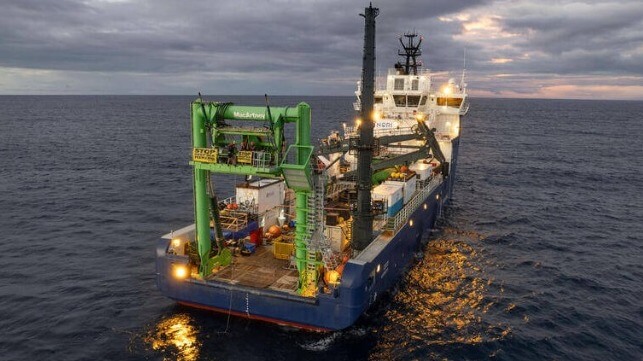Court Orders Greenpeace Activists Off Deep-Sea Mining Ship

A court in the Netherlands has ordered Greenpeace to remove a group of activists from the deep sea mining research ship Coco, which is currently on station in the Clarion-Clipperton Zone to evaluate a polymetallic nodule site.
Last week, the Greenpeace vessel Arctic Sunrise met up with the Coco and launched an attempt to block its operations. It deployed a pair of kayaks and a pair of Zodiacs to get near to Coco's hull, and it sent a team of climbers aboard to occupy the Coco's A-frame platform. The operation has prevented the crew of the Coco from carrying out the vessel's assigned mission of collecting data on conditions on the bottom.
Coco's charterer, The Metals Company (TMC), filed suit in the Netherlands through its subsidiary NORI. The suit called for an injunction to order Greenpeace to immediately cease and desist.
On Thursday, a district court judge in Amsterdam granted the request and ordered the activists to vacate the ship. The order would impose a fine of about $55,000 a day if Greenpeace fails to comply. However, the judge also said that it was "understandable" that the group wanted to protest deep sea mining, as TMC's activities could have "possibly very serious consequences" for the environment.
The judge did not grant TMC's request for an order to require Arctic Sunrise and its boats to stay 500 meters back from the ship. This opening allows the activists' Zodiacs to continue to operate in close proximity to the research vessel.
“This is without question a massive setback for the deep sea mining industry. The Dutch court not only affirmed Greenpeace’s right to protest but also agreed that nodule mining is a highly controversial activity," said Mads Christensen, head of Greenpeace International.
According to TMC, Greenpeace's climb team complied with the court order right away and disembarked the Coco.
In a statement, Greenpeace said that TMC "can't stand that Greenpeace is watching and opposing them at every turn," and accused the firm of attempting to avoid scrutiny.

that matters most
Get the latest maritime news delivered to your inbox daily.
TMC responded that it respects Greenpeace's right to protest and exercise free speech, but that the group must do so without interfering with the ship's operations. "Our foremost responsibility is to ensure the safe continuance of our legally-mandated operations, and the safety of all those involved," said TMC CEO and Chairman Gerard Barron. "Greenpeace are free to protest from a safe distance and to assert their opinion, but theirs is not the only one that matters."
24 nations and 800 experts have called for a moratorium on deep-sea mining until after more research has been done on the potential impact on marine life. The Clarion-Clipperton Zone is little studied, and scientific surveys of the area often uncover new species (sometimes dozens of them). Critics of deep-sea mining warn that potential impacts - sediment plumes blanketing nearby areas, toxins released into the water column from mining wastes, habitat destruction from the removal of the nodules themselves - are unknown and potentially harmful to native species.
